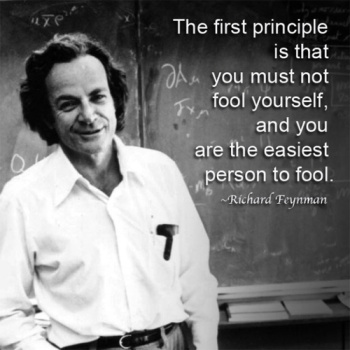Where modern economics went wrong [embedded content] Many economists have over time tried to diagnose what’s the problem behind the ‘intellectual poverty’ that characterizes modern mainstream economics. Rationality postulates, rational expectations, market fundamentalism, general equilibrium, atomism, over-mathematisation are some of the things one have been pointing at. But although these assumptions/axioms/practices are deeply problematic, they are mainly reflections of a deeper and more fundamental problem. The main problem with mainstream economics is its methodology. The fixation on constructing models showing the certainty of logical entailment has been detrimental to the development of a relevant and realist economics. Insisting on formalistic (mathematical) modeling forces the economist to give upon on realism and substitute axiomatics for real world relevance. The price for rigour and precision is far too high for anyone who is ultimately interested in using economics to pose and (hopefully) answer real world questions and problems. This deductivist orientation is the main reason behind the difficulty that mainstream economics has in terms of understanding, explaining and predicting what takes place in our societies.
Topics:
Lars Pålsson Syll considers the following as important: Economics
This could be interesting, too:
Lars Pålsson Syll writes Schuldenbremse bye bye
Lars Pålsson Syll writes What’s wrong with economics — a primer
Lars Pålsson Syll writes Krigskeynesianismens återkomst
Lars Pålsson Syll writes Finding Eigenvalues and Eigenvectors (student stuff)
Where modern economics went wrong
Many economists have over time tried to diagnose what’s the problem behind the ‘intellectual poverty’ that characterizes modern mainstream economics. Rationality postulates, rational expectations, market fundamentalism, general equilibrium, atomism, over-mathematisation are some of the things one have been pointing at. But although these assumptions/axioms/practices are deeply problematic, they are mainly reflections of a deeper and more fundamental problem.
 The main problem with mainstream economics is its methodology.
The main problem with mainstream economics is its methodology.
The fixation on constructing models showing the certainty of logical entailment has been detrimental to the development of a relevant and realist economics. Insisting on formalistic (mathematical) modeling forces the economist to give upon on realism and substitute axiomatics for real world relevance. The price for rigour and precision is far too high for anyone who is ultimately interested in using economics to pose and (hopefully) answer real world questions and problems.
This deductivist orientation is the main reason behind the difficulty that mainstream economics has in terms of understanding, explaining and predicting what takes place in our societies. But it has also given mainstream economics much of its discursive power – at least as long as no one starts asking tough questions on the veracity of – and justification for – the assumptions on which the deductivist foundation is erected. Asking these questions is an important ingredient in a sustained critical effort at showing how nonsensical is the embellishing of a smorgasbord of models founded on wanting (often hidden) methodological foundations.
The mathematical-deductivist straitjacket used in mainstream economics presupposes –as apostrophized by Kirman — atomistic closed-systems, i.e., something that we find very little of in the real world, a world significantly at odds with an (implicitly) assumed logic world where deductive entailment rules the roost. The kind of formal-analytical and axiomatic-deductive mathematical modeling that makes up the core of mainstream economics is hard to make compatible with a real-world ontology. It is also the reason why so many critics find mainstream economic analysis patently and utterly unrealistic and irrelevant.
Although there has been a clearly discernible increase and focus on ’empirical’ economics in recent decades, the results in these research fields have not fundamentally challenged the main deductivist direction of mainstream economics. They are still mainly framed and interpreted within the core ‘axiomatic’ assumptions of individualism, instrumentalism and equilibrium that make up even the ‘new’ mainstream economics. Although, perhaps, a sign of an increasing – but highly path-dependent – theoretical pluralism, mainstream economics is still, from a methodological point of view, mainly a deductive project erected on a foundation of empty formalism.
If we want theories and models to confront reality there are obvious limits to what can be said ‘rigorously’ in economics. For although it is generally a good aspiration to search for scientific claims that are both rigorous and precise, we have to accept that the chosen level of precision and rigour must be relative to the subject matter studied. An economics that is relevant to the world in which we live can never achieve the same degree of rigour and precision as in logic, mathematics or the natural sciences. Collapsing the gap between model and reality in that way will never give anything else than empty formalism.
In mainstream economics, with its addiction to the deductivist approach of formal- mathematical modeling, model consistency trumps coherence with the real world. That is sure getting the priorities wrong. Creating models for their own sake is not an acceptable scientific aspiration – impressive-looking formal-deductive models should never be mistaken for truth.
When applying deductivist thinking to economics, economists usually set up ‘as if”’ models based on a set of tight axiomatic assumptions from which consistent and precise inferences are made. The beauty of this procedure is of course that if the axiomatic premises are true, the conclusions necessarily follow. The snag is that if the models are to be relevant, we also have to argue that their precision and rigour still holds when they are applied to real-world situations. They often don’t. When addressing real economies, the idealizations necessary for the deductivist machinery to work, simply don’t hold.
So how should we evaluate the search for ever greater precision and the concomitant arsenal of mathematical and formalist models? To a large extent, the answer hinges on what we want our models to perform and how we basically understand the world.
The world as we know it, has limited scope for certainty and perfect knowledge. Its intrinsic and almost unlimited complexity and the interrelatedness of its organic parts prevent the possibility of treating it in a relevant way as constituted by separate atoms with discretely distinct, separable and stable causal relations. Our knowledge accordingly has to be of a rather fallible kind.
To search for precision and rigour in such a world is self-defeating, at least if precision and rigour are supposed to assure external validity. The only way to defend such an endeavour is to restrict oneself to prove things in closed model-worlds. Why we should care about these and not ask questions of relevance is hard to see. We have to at least justify our disregard for the gap between the nature of the real world and our theories and models of it.
If the real world is fuzzy, vague and indeterminate, then why should our models build upon a desire to describe it as precise and predictable? Even if there always has to be a trade-off between theory-internal validity and external validity, we have to ask ourselves if our models are relevant.
 Rigour, coherence and consistency have to be defined relative to the entities for which they are supposed to apply. Too often they have been restricted to questions internal to the theory or model. But clearly the nodal point has to concern external questions, such as how our theories and models relate to real-world structures and relations. Applicability rather than internal validity ought to be the arbiter of taste.
Rigour, coherence and consistency have to be defined relative to the entities for which they are supposed to apply. Too often they have been restricted to questions internal to the theory or model. But clearly the nodal point has to concern external questions, such as how our theories and models relate to real-world structures and relations. Applicability rather than internal validity ought to be the arbiter of taste.
So – if we want to develop a new and better economics we have to give up on the deductivist straitjacket methodology. To focus scientific endeavours on proving things in models, is a gross misapprehension of the purpose of economic theory. Deductivist models and methods disconnected from reality are not relevant to predict, explain or understand real world economies.
The problem seems to be embodied in what is an essential feature of a centuries-long tradition in economics, that of treating individuals as acting independently of each other …
The idea that we should start at the level of the isolated individual is one which we may well have to abandon.
Alan Kirman: The intrinsic limits of modern economic theory
